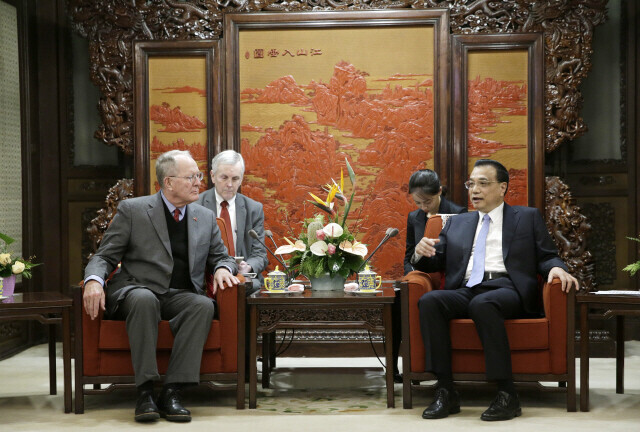hankyoreh
Links to other country sites 다른 나라 사이트 링크
An expert’s opinion on Korea’s options in the hegemonic rivalry between US, China

On Oct. 11, Graham Allison will be delivering a keynote presentation titled “In an Era of Rising Hegemony, What’s South Korea’s Choice?” in Keynote Session 2 of the 14th Asia Future Forum, which is being hosted by the Hankyoreh and organized by the Hankyoreh Economy and Society Research Institute.
Allison has been advising the US Department of Defense since the 1960s as a member of the Defense Policy Board and in other positions. He served as special advisor to the secretary of defense under Ronald Reagan, a Republican president, and as assistant secretary of defense under Bill Clinton, a Democratic president. As this suggests, his scope of activity transcends any specific administration or political party. He has also blurred the boundary between theory and practice.
Allison was the “founding dean” of the Harvard Kennedy School, a position he held from 1977 to 1989. Later, he served as director of the Belfer Center for Science and International Affairs, also at Harvard.
Among the numerous books that Allison has authored, “Essence of Decision: Explaining the Cuban Missile Crisis” and “Destined for War: Can America and China Escape Thucydides’s Trap?” are global bestsellers that have been recognized as modern classics.
Along with 100-year-old Henry Kissinger, Allison is regarded as the greatest living expert on foreign affairs and national security. His counsel is especially important in the confusion of our era, when the hegemonic rivalry between the US and China is heating up and the world order is being reshaped.
Allison’s book “Destined for War: Can America and China Escape Thucydides’s Trap?” is back in the spotlight, six years after its original publication. The book describes 16 times over the past five centuries when a hegemonic power was challenged by a rising power. Twelve of those confrontations have led to war, while the hegemonic and rising power have only managed to avoid war four times.
The Thucydides trap — a term coined by Allison himself — describes the dangerous dynamics that tend to emerge when a rising power threatens to replace a dominant power.
Thucydides was the ancient Athenian historian who wrote “History of the Peloponnesian War,” describing a famous conflict between Athens and Sparta.

As Allison describes it, the hegemonic power is the US, and the rising power is China. The clash between the two countries could either preserve the peace (as in four of the past 16 such clashes) or lead to war (as in the other twelve).
Recently, China’s rise has been undermining the US’ position, and the US-led international order has been losing coherence.
Interestingly, the Thucydides trap is often triggered indirectly by third parties, rather than by the rival powers themselves. The Peloponnesian War arose from a conflict between Corinth and Corcyra (modern-day Corfu), not Athens and Sparta, while World War I was set off by the assassination of Archduke Franz Ferdinand, heir to the Austro-Hungarian Empire.
In a TED talk in 2018, Allison expressed his concern that North Korea, led by Kim Jong-un, might play such a role.
While Allison suggests that strengthening economic interdependence can reduce the risk of war that results from falling into Thucydides’ trap, the US and China’s hegemonic competition has already spread beyond the political and military domains to the economy. Rising tariffs are part of an intensifying trade war between the two countries, which are locked in a do-or-die competition in semiconductors and other high-tech sectors.
One outcome is the reorganization of the global division of labor. As hostile fronts coalesce between the two powers, South Korea is coming under greater pressure to definitively align itself with one side or the other. In short, the hegemonic struggle between the US and China is directly impacting the lives of those on the Korean Peninsula.
At the Asia Future Forum on Oct. 11, we will hear from Graham Allison, a renowned foreign policy and national security strategist, about what choice should be made by Koreans, who stand at the center of this hegemonic clash.
Readers who are interested in attending can sign up here: www.asiafutureforum.org
By Ryu Yi-geun, senior staff writer at the Hankyoreh Economy and Society Research Institute; Ro Young-joon, research assistant at the Hankyoreh Economy and Society Research Institute
Please direct questions or comments to [english@hani.co.kr]

Editorial・opinion
![[Column] Season 2 of special prosecutor probe may be coming to Korea soon [Column] Season 2 of special prosecutor probe may be coming to Korea soon](https://flexible.img.hani.co.kr/flexible/normal/500/300/imgdb/original/2024/0426/3317141030699447.jpg) [Column] Season 2 of special prosecutor probe may be coming to Korea soon
[Column] Season 2 of special prosecutor probe may be coming to Korea soon![[Column] Park Geun-hye déjà vu in Yoon Suk-yeol [Column] Park Geun-hye déjà vu in Yoon Suk-yeol](https://flexible.img.hani.co.kr/flexible/normal/500/300/imgdb/original/2024/0424/651713945113788.jpg) [Column] Park Geun-hye déjà vu in Yoon Suk-yeol
[Column] Park Geun-hye déjà vu in Yoon Suk-yeol- [Editorial] New weight of N. Korea’s nuclear threats makes dialogue all the more urgent
- [Guest essay] The real reason Korea’s new right wants to dub Rhee a founding father
- [Column] ‘Choson’: Is it time we start referring to N. Korea in its own terms?
- [Editorial] Japan’s rewriting of history with Korea has gone too far
- [Column] The president’s questionable capacity for dialogue
- [Column] Are chaebol firms just pizza pies for families to divvy up as they please?
- [Column] Has Korea, too, crossed the Rubicon on China?
- [Correspondent’s column] In Japan’s alliance with US, echoes of its past alliances with UK
Most viewed articles
- 1AI is catching up with humans at a ‘shocking’ rate
- 2Korea’s 1.3% growth in Q1 signals ‘textbook’ return to growth, says government
- 3No good, very bad game for Korea puts it out of Olympics for first time since 1988
- 4[Column] Park Geun-hye déjà vu in Yoon Suk-yeol
- 5[Column] Season 2 of special prosecutor probe may be coming to Korea soon
- 6Division commander ordered troops to enter raging flood waters before Marine died, survivor says
- 7Is Japan about to snatch control of Line messenger from Korea’s Naver?
- 8After election rout, Yoon’s left with 3 choices for dealing with the opposition
- 9Will NewJeans end up collateral damage in internal feud at K-pop juggernaut Hybe?
- 10Marriages nosedived 40% over last 10 years in Korea, a factor in low birth rate